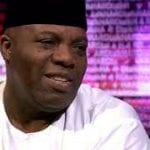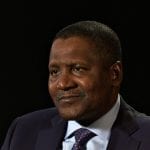By Sufuyan Ojeifo
Perusing the plethora of reactions to the arraignment of the Chief Justice of Nigeria (CJN), Walter Nkanu Onnoghen, before the Code of Conduct Tribunal (CCT) on allegations of false declaration of assets by the Code of Conduct Bureau (CCB), it is obvious the matter has spawned considerable emotion. Reports that filtered in as I was writing this piece indicated that the trial had been adjourned to Tuesday, January 22, 2019.
The Onnoghen matter is a prickly one. And, whereas, we should have witnessed dispassionate responses, the converse has been the case. For instance, a vast majority of members of the bar have been unanimous and vociferous in their argument that the CJN or any sitting judicial officer, for that matter, cannot be tried by the CCT or the courts without the National Judicial Commission (NJC) first investigating allegations leveled against such officer and recommending concomitant sanctions.
The judicial precedents cited in respect of the position supra are Nganjiwa vs. FRN (2017), a subsisting Court of Appeal decision and FGN vs. Justice Sylvester Ngwuta (2018), a High Court decision. The positions of the courts in the two cases were grounded on Section 158 (1) of the 1999 Constitution, as amended, which vests the NJC with powers to deal with matters pertaining to allegations of misconduct and discipline of judicial officers.
It is the outcome of the investigation that will activate the prosecution of the officer by the relevant agencies of government at the CCT, courts or otherwise, depending on what the findings of the investigation are. Therefore, NJC’s investigation is a precondition for the prosecution of judicial officers for offences committed in the course of their official duties.
Significantly, the provisions of the constitution do not in any way approximate to or confer immunity on judicial officers. But there are exceptions. Judicial officers are not exempted from direct prosecution for such cases as murder, culpable homicide, et al, not being offences that are committed in the course of their official duties.
The clear breach of the legally-recognized procedure of exposing the CJN to sanctions for alleged offences committed by him without prior investigation by the NJC has precipitated a rash of criticisms against the CCB, an agent of the executive arm of the federal government. The critical concern expressed by lawyers and many other Nigerians is not much of opposition to the prosecution of Onnoghen but more about the adoption of a wrong procedure to achieve that.
The CCB was wrong to have sidestepped the procedure for dealing with the issue of alleged false declaration of assets by the CJN. It is not in the place of the CCB to appropriate the powers to act on a petition by a civil society group, the Anti-Corruption and Research-Based Data Initiative (ARDI), and to proceed to file a six-count charge against the CJN at the CCT.
Indeed, what the CCB should have done was to have forwarded the petition to the NJC for investigation. If the outcome was damning, it could then be sent to the relevant agencies that would prosecute the matter at the CCT or to the Senate by the president in line with the provisions of Section 292 of the 1999 Constitution, as amended, to activate his removal.
The point must be clearly made that no one is above the law of the land. If Onnoghen had breached the Code of Conduct for public officers on asset declaration, he should not be insulated from prosecution; and, if found guilty, he should be appropriately sanctioned.
There must be more to the issues of alleged non-declaration of some domiciliary bank accounts in foreign currencies, according to the petitioner, than meets the eye. Could details of those deposits have been the reason for their alleged non-declaration? Can’t it therefore be argued that the non-declaration of those accounts was strategic?
Now, a line must be drawn between the failure of the CCB to follow laid-down procedure – a wrongful act in itself – and the offences allegedly committed by the CJN. Sanctioning Onnoghen cannot be done by the wrong quarters and in a fashion that is against the law.
Essentially, the mischief of the alleged wrong committed by Onnoghen cannot be cured by the CCT or any court trial, until the NJC has carried out its investigation into the alleged offences and come out with its findings and recommendations. The second wrong was committed by the CCB, which charged the CJN before the CCT that has no jurisdictional powers to entertain the matter. The mischief of these two wrongs cannot be cured through the application of the wrong procedures.
Onnoghen did not appear before the CCT on Monday, but his lawyers were there to protest the manner of his arraignment. The team of lawyers knows its onion and how to get round the issue that is gradually unfolding and assuming its own life in the ramifications of law and politics. This brings me to the politics of his trial. Some persons have conjectured that Onnoghen’s debacle is politically-motivated.
They argue that since he has an important superintending role to play in the adjudication of presidential election petition(s) that may arise from the February 16 poll; it is politically strategic and wise for the All Progressives Congress (APC)-led federal government to clear the path to a second term in office of possible obstacles.
Onnoghen, a forthright and disciplined judge who, for instance, was one of the three justices that ruled in favour of Buhari in his petition against the 2007 presidential victory of Umaru Musa Yar’Adua in a verdict that ended 3-4, is one of the speculated obstacles. The imaginary fear is that he could not be trusted to compromise if he is needed to do so. Therefore, removing him would be in pari materia with the original plot.
Remember also that the Supreme Court is sui generis in the matter of hearing presidential election petition. It is a court of first and final instance. To take chances with Onnoghen might not be a good idea to forces supposedly angling to indict him. Could that be their reason to demonize, demoralize, discredit and force him to either resign or recuse self from adjudicating the presidential election petition?
This is a prognosis that is well understood. It could as well be dismissed as a conspiracy theory. Whether it is a prognosis or a theory, I have refrained from climbing on the bandwagon of partisan bias and dialectic in the frenzy to condemn the CBB action in the manner many lawyers, except Professor Itse Sagay (SAN), have done. I recognize that both sides – CCB and Onnoghen- have committed some mistakes, which must be corrected.
And, perhaps, it bears mentioning here that if the objective of the imaginary powers-that-be is to remove Onnoghen and replace him with another CJN that could be trusted to do their bidding, arraigning him before the CCT, which is bereft of jurisdictional power, is not going to promote the achievement of that goal. It is wrong to subject the CJN to the ignominy of stepping into the dock at the CCT when the needful has not been done.
Section 292 (1)(a) and (b) of the 1999 Constitution, as amended, supplies the best cure for this egregious mischief. Aside from the NJC recommending sanctions against a judicial officer to the President or State Governor, the President can cause the CJN, as adumbrated supra, to be removed, acting on an address supported by two-thirds majority of the Senate.
But then in the present circumstance, that may be impossible to achieve. It is common knowledge that there is feud between the executive and legislature and that will problematize the process and the Senate cannot seamlessly be deployed in the removal of Onnoghen. Period!
- Ojeifo, a journalist, contributed this piece via ojwonderngr@yahoo.com
























Leave a comment